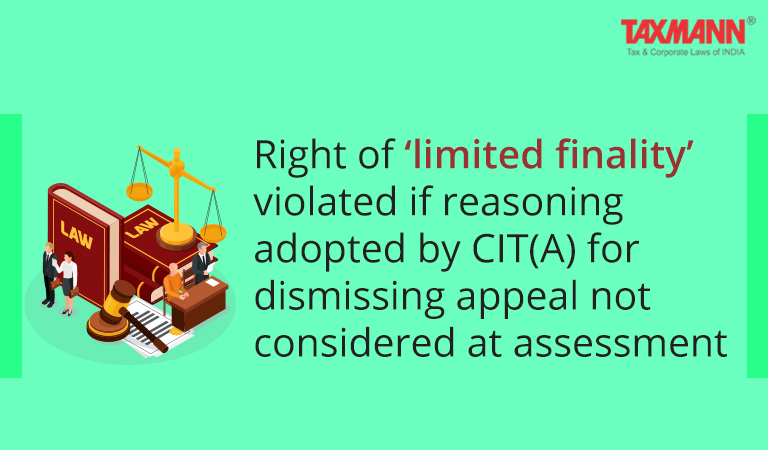Right of ‘limited finality’ violated if reasoning adopted by CIT(A) for dismissing appeal not considered at assessment
- Blog|News|Income Tax|
- 2 Min Read
- By Taxmann
- |
- Last Updated on 22 October, 2021

Case Details: Energy Infratech (P.) Ltd. v. DCIT - [2021] 131 taxmann.com 124 (Delhi - Trib.)
Judiciary and Counsel Details
-
- Amit Shukla, Judicial Member and Anadee Nath Misshra, Accountant Member
- Puneet Thukral, CA for the Appellant.
- Avikal Manu, Sr. DR for the Respondent.
Facts of the Case
Assessee-company claimed deduction on account of payment towards reimbursement of expenses to its USA-based subsidiary company. The Assessing Officer (AO) noted that the assessee’s subsidiary was a separate tax entity, and it had already taken allowance of such expenses incurred by it. Therefore, reimbursement of expenses by the parent company was a double deduction being claimed by the assessee.
AO further held that the assessee had not deducted TDS on such payment made by it. Accordingly, he disallowed the claim of deduction towards reimbursement of expenses made by the assessee.
CIT(Appeals) also confirmed said disallowance, however, on a completely different ground.
ITAT Held
CIT(A) held that the assessee failed to prove that such expenditure was incurred by the assessee wholly and exclusively for business purposes.
On further appeal, the assessee contended that he got no opportunity to make submission before AO in respect of such reasoning adopted by Commissioner (Appeals). Since reasoning adopted by CIT(A) for dismissing the assessee’s appeal was not considered at the stage of assessment proceedings before AO, there was a violation of the assessee’s right of ‘limited finality’.
Therefore, the impugned order was to be set aside, and the matter was to be remanded back to AO for fresh order after providing the opportunity to assessee to make necessary submissions regarding reasoning adopted by CIT(A).
Disclaimer: The content/information published on the website is only for general information of the user and shall not be construed as legal advice. While the Taxmann has exercised reasonable efforts to ensure the veracity of information/content published, Taxmann shall be under no liability in any manner whatsoever for incorrect information, if any.

Taxmann Publications has a dedicated in-house Research & Editorial Team. This team consists of a team of Chartered Accountants, Company Secretaries, and Lawyers. This team works under the guidance and supervision of editor-in-chief Mr Rakesh Bhargava.
The Research and Editorial Team is responsible for developing reliable and accurate content for the readers. The team follows the six-sigma approach to achieve the benchmark of zero error in its publications and research platforms. The team ensures that the following publication guidelines are thoroughly followed while developing the content:
- The statutory material is obtained only from the authorized and reliable sources
- All the latest developments in the judicial and legislative fields are covered
- Prepare the analytical write-ups on current, controversial, and important issues to help the readers to understand the concept and its implications
- Every content published by Taxmann is complete, accurate and lucid
- All evidence-based statements are supported with proper reference to Section, Circular No., Notification No. or citations
- The golden rules of grammar, style and consistency are thoroughly followed
- Font and size that’s easy to read and remain consistent across all imprint and digital publications are applied



 CA | CS | CMA
CA | CS | CMA
